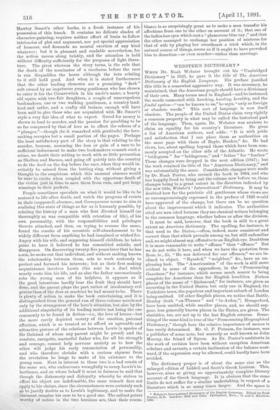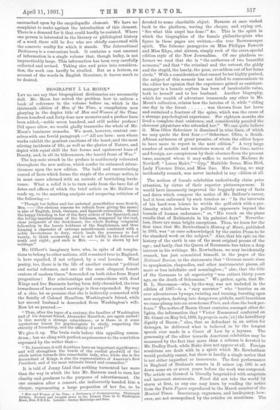WEBSTER'S DICTIONARY.*
WHEN Dr. Noah Webster brought out his "Unabridged Dictionary" in 1828, he gave it the title of The American Dictionary of the English Language. His preface justified this title in a somewhat aggressive way. It was necessary, he maintained, that the American people should have a dictionary of their own. Many terms used in England—and he instanced the words connected with hawking, hunting, heraldry, and the feudal system--" can be known to us," he says, "only as foreign or obsolete words." This sort of language is now itself obsolete. The people of the United States claim very rightly a common property in what may be called the historical part of the language. Then, again, Dr. Webster was anxious to claim an equality for his country's literature. He gives a list of American authors, and adds "It is with pride and satisfaction that I can place them as authorities on the same page with those of Boyle, Hooker," &e. He had views, too, about spelling beyond those which have been com- monly accepted on the other side of the Atlantic. He wrote " bridegoom " for "bridegroom," and " tether " for "feather." These changes were dropped in the next edition (1847) ; but the work retained its title of the " A.merican Dictionary," and was substantially the same. Considerable changes were made by Dr. Noah Porter, who revised the book in 1964, and who has happily lived to bring out the volume now before us, these changes being to a great extent in the direction indicated by the new title, Webster's International' Dictionary. It may be doubted how far the patriotic old gentleman whose views are so uncompromisingly expressed in the preface of 1828 would have approved of the change, but there can be no question about the improvement which it indicates. The authorities cited are now cited because they are classical writers belonging to the common language, whether before or after the division.
It must be said, however, that the book is still to a great extent an American dictionary. The spelling, for instance, is that used in the States,—often, indeed, more consistent and correct than that which prevails among us, but still unfamiliar and, we might almost say, offensive to an English eye. Doubtless it is more reasonable to write " offense " than "offence." But we do not write it here, and when we have the quotation from Rom. iv., 25, "He was delivered for our offenses," we are in- clined to object. "Equaled," "neighbor," &c., have an un- pleasing look. The " Americanism " of the work is still more evident in some of the appendices, in the "Pronouncing Gazetteer," for instance, which seems much nearer to being complete for American than for English localities. Sixteen places of the name of "Richmond," for instance, are given as occurring in the United States, but only one in England, the Yorkshire town, the populous and important suburb of London being omitted. Of other English places, we notice that Battle, Henley (both " on-Thames " and "in-Arden,") Hungerford, have been omitted, while smaller places, and, we should sup- pose, less generally known places in the States, are given. The statistics, too, are not up to the last English returns. Some- thing of the same kind is true of the "Pronouncing Biographical Dictionary," though here the relative importance of names is less easily determined. Mr. G. P. Putnam, for instance, was a publisher of some note, but scarcely as well known as John Murray, the friend of Byron. As Dr. Porter's assistants in the work of revision have been without exception American scholars and savants, a certain inclination of the balance west- ward, if the expression may be allowed, could hardly have been avoided.
The dictionary proper is of about the same size as the enlarged edition of Liddell and Scott's Greek Lexicon. This, however, aims at giving an approximately complete literary account of the Greek language. It is obvious that the same limits do not suffice for a similar undertaking, in respect of a literature which is so many times larger. And the space is
Webster'e International Diationat7 of the Englitth Language. Edited by Noah Porter, D.D. London : Bell and Ilona. Fpringtield, Mass. : G. and 0. Merriam. encroached upon by the encyclopedic element. We have no complaint to make against the introduction of this element. There is a demand for it that could hardly be resisted. Where one person is interested in the literary or philological history of a word, there will be five who are chiefly concerned with the concrete reality for which it stands. The International Dictionary is a convenient book. It contains a vast amount of information in a single volume that, though bulky, is not impracticably large. This information has been very carefully collected and revised. Taking size and price into considera- tion, the work can hardly be rivalled. But as a lexicon, an account of the words in English literature, it leaves much to be desired.



































 Previous page
Previous page